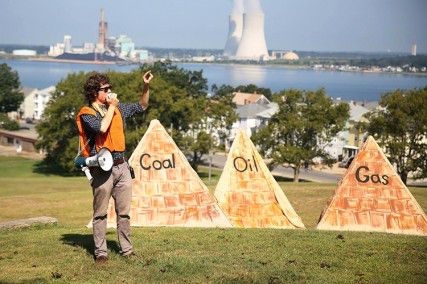
College of Engineering junior John Griese and second-year College of Arts and Sciences graduate student Ben Thompson helped organize the 60-mile Energy Exodus, which concluded in early September.
“The idea was to publicize the resistance Cape Wind is facing from the fossil fuel industry,” Griese said.
Participants in the march met in Fall River in protest of one of New England’s largest coal- and gas-fired plants nearby. The march ended in Barnstable, a town whose officials have recently filed lawsuits opposing the establishment of Cape Wind, he said.
The lawsuits filed by town of Barnstable officials are bankrolled by fossil fuel businessman and millionaire Bill Koch, Griese said.
“He [Koch] sees the monopoly of coal, oil and gas threatened by the success of projects like this and is willing to stop at nothing to make sure they do not get to build in the United States and to cut into his market share,” he said.
Between 60 and 80 people joined Thompson and Griese on the Energy Exodus, a joint effort between members of Students for a Just and Stable Future, Better Future Project and the 350 Massachusetts organization.
“The march was designed to publicly condemn Koch’s actions, and to call on the town of Barnstable to drop its bogus lawsuits and build Cape Wind,” he said.
Griese said Cape Wind is one of the most important renewable energy projects in the U.S., as it offsets carbon dioxide emissions.
“It would have the capacity to provide for 75 percent of the power demand of the cape, while only increasing electricity prices by a few dollars per month in the short term,” he said. “This would also be the first large scale offshore wind farm in the United States, and would pave the way for similar projects all along the east coast.”
The march went well and connected climate change activists from around the state, Thompson said.
“It was an incredible opportunity for people working on this issue across the state in the region to have some time to get to know each other,” he said. “I think it was a powerful experience for a lot of people.”
Other activists on the march were joined by students from all over the region investing in their future by advocating for a more livable planet, Thompson said.
“Students have a unique incentive to be involved in plans to stop climate change because we do need this planet and this society and this economy to last a lot longer than others,” he said. “Right now, the science is not in our favor.”
CAS professor Nathan Phillps said BU students, many of them part of the student group Divest BU, were instrumental in the march.
“Much of the energy came from students in the area, and those are students from Brandeis [University] and Tufts [University], BU, Boston College, Harvard [University] and MIT [Massachusetts Institute of Technology] … just really an amazing collection of students from Greater Boston,” Phillips, an Earth and environment professor, said. “So, to see BU prominent in that was great.”
Climate change is an important issue for students to keep track of, he said.
“This is the future that all students at BU are all going to inherit, so to raise awareness of this issue and to try to make the change that we need is crucial,” Phillips said. “All BU students should be aware and concerned about the issue.”






















































































































nathan phillips • Sep 14, 2013 at 8:17 am
Two other BU people who provided crucial leadership for this event were Theology graduate student Ashley Anderson and Theology Alum. Marla Marcum.